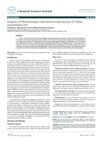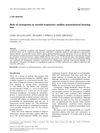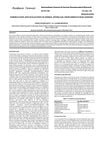 19 citations,
August 2014 in “Journal of Ethnopharmacology”
19 citations,
August 2014 in “Journal of Ethnopharmacology” The study created a test that found hormonal and toxic effects in plant and fungal extracts using prostate cancer cells.
[object Object]  March 2024 in “Journal of medicinal plants studies”
March 2024 in “Journal of medicinal plants studies” Hibiscus has medicinal benefits but can be toxic in high doses and is unsafe for pregnant women and infants.
 75 citations,
November 2016 in “Medicines”
75 citations,
November 2016 in “Medicines” Beta-sitosterol has potential health benefits but needs more research to fully understand its effects and improve its use in treatments.
 65 citations,
April 2002 in “Journal of Alternative and Complementary Medicine”
65 citations,
April 2002 in “Journal of Alternative and Complementary Medicine” Plant extracts effectively reduce hair loss and increase growth, offering a safe alternative treatment.
 39 citations,
June 2017 in “Journal of Applied Research on Medicinal and Aromatic Plants”
39 citations,
June 2017 in “Journal of Applied Research on Medicinal and Aromatic Plants” Plant-based ingredients are effective and safe for modern skincare products.
 9 citations,
January 1966 in “Economic botany”
9 citations,
January 1966 in “Economic botany” Plant-based ingredients in hair care are being replaced by synthetic alternatives.
 7 citations,
January 2017 in “Clinical and medical investigations”
7 citations,
January 2017 in “Clinical and medical investigations” Suriname uses many plants for beauty, with potential for a beauty industry, but more evidence is needed for product effectiveness.
 1 citations,
September 2023 in “Molecules (Basel. Online)”
1 citations,
September 2023 in “Molecules (Basel. Online)” Plant sterols have health benefits like lowering cholesterol, but more research is needed to understand their effects and improve their extraction and sustainability.
 1 citations,
January 2016 in “Springer briefs in molecular science”
1 citations,
January 2016 in “Springer briefs in molecular science” Natural plant-based substances can be used as effective hair dyes.
 January 2020 in “Elsevier eBooks”
January 2020 in “Elsevier eBooks” Plant-based chemicals may help hair growth and prevent hair loss but need more research to compete with current treatments.

Antimalarial agents are effective for LPP, and intralesional steroids are effective for FFA.
August 2021 in “Asian Journal of Pharmaceutical and Clinical Research” Plant extracts in shampoo improved hair thickness and density in men with hair loss.
 4 citations,
September 2014 in “Elsevier eBooks”
4 citations,
September 2014 in “Elsevier eBooks” Use some skin medications with caution during pregnancy; avoid strong steroids, certain eczema treatments, and systemic retinoids, but many topical treatments and nasal sprays are safe.
1 citations,
January 2020 in “Bioscience Reports” Long-term use of finasteride in women can cause hormonal changes, DNA damage, and menstrual issues.
 January 2009 in “Elsevier eBooks”
January 2009 in “Elsevier eBooks” Some plant-based treatments may help with ovary function, insulin resistance, and excess male hormones in PCOS, but more research is needed to confirm their safety and effectiveness.
 10 citations,
December 2019 in “International journal of medicinal chemistry”
10 citations,
December 2019 in “International journal of medicinal chemistry” Chemicals from the plant Dicerocaryum senecioides were found to safely speed up and increase hair growth in mice.
 3 citations,
January 2016 in “Chemical sciences journal”
3 citations,
January 2016 in “Chemical sciences journal” Tridax procumbens plant extracts, especially from ethanol, have strong antibacterial effects and contain beneficial compounds like flavonoids and tannins.
 2 citations,
April 2022 in “Clinical, cosmetic and investigational dermatology”
2 citations,
April 2022 in “Clinical, cosmetic and investigational dermatology” A new plant-based treatment was effective for hair regrowth in women with a specific type of hair loss that didn't respond to usual treatments.
 4 citations,
September 2020 in “BioMed Research International”
4 citations,
September 2020 in “BioMed Research International” Timosaponin BII, a plant extract, was found to promote hair growth in mice, similarly to minoxidil.
 13 citations,
June 2020 in “International Journal of Dermatology”
13 citations,
June 2020 in “International Journal of Dermatology” A rare scalp condition mainly in older women can be treated with various alternatives to steroids, which may have fewer side effects.
 8 citations,
January 2005 in “Acta Oto-Laryngologica”
8 citations,
January 2005 in “Acta Oto-Laryngologica” Ciclosporin might be a good alternative treatment for certain hearing loss that responds to steroids.
 19 citations,
May 2014 in “Molecules”
19 citations,
May 2014 in “Molecules” Avicequinone C, a compound found in the Avicennia marina plant, can reduce hair loss by inhibiting a hormone linked to androgenic alopecia.

The hydrogel with 20% Hibiscus rosa-sinensis extract was the best for potential therapeutic use.
 41 citations,
July 2015 in “Current Drug Discovery Technologies”
41 citations,
July 2015 in “Current Drug Discovery Technologies” Some plants may help with hair growth and have fewer side effects than synthetic drugs, but more research is needed to confirm their effectiveness.
 11 citations,
January 2016 in “Journal of clinical & experimental dermatology research”
11 citations,
January 2016 in “Journal of clinical & experimental dermatology research” Substance abuse can cause various skin problems, including marks from injections, sores, premature aging, and increased cancer risk.
8 citations,
July 2021 in “F1000Research” Plant-based compounds might be a promising alternative for prostate cancer treatment with fewer side effects.
[object Object]  7 citations,
June 2021 in “Trends in Food Science and Technology”
7 citations,
June 2021 in “Trends in Food Science and Technology” Western diet may cause male pattern baldness; low glycemic diet with magnesium could help.
 5 citations,
October 2022 in “Journal of Ethnopharmacology”
5 citations,
October 2022 in “Journal of Ethnopharmacology” The plant Anemarrhena asphodeloides has multiple health benefits but its safety at certain doses is uncertain.
3 citations,
January 2017 in “Journal of clinical and diagnostic research” Injecting steroids like Triamcinolone Acetonide for skin treatments can cause Cushing's Syndrome.
 2 citations,
November 2022 in “Frontiers in Pharmacology”
2 citations,
November 2022 in “Frontiers in Pharmacology” Local healers in Addis Ababa use 81 medicinal plants, mainly from the Asteraceae family, to treat skin and general diseases, with Echinops kebericho being an endangered plant important in their practices.

























